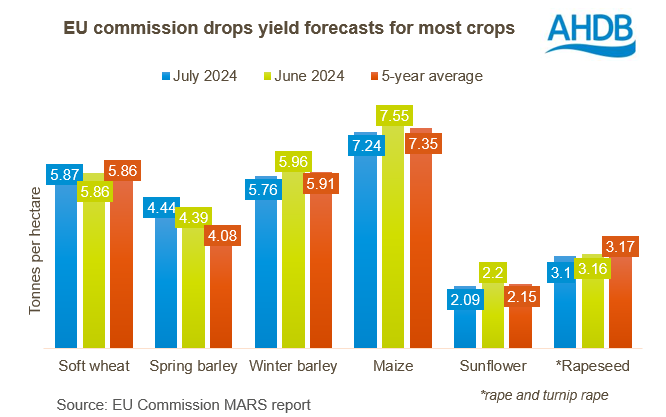EU-27 yield forecast revised downwards for most crops: Grain market daily
Wednesday, 24 July 2024
Market commentary
- UK feed wheat futures (Nov-24) closed yesterday at £196.00/t, down £0.35/t on Monday’s close. New crop futures (May-25) closed at £205.15/t, down £1.00/t over the same period.
- The domestic market followed both the Chicago and Paris futures down yesterday. The market faced pressure due to anticipated ample global wheat supply, driven by crop progress in the US and better crop outlooks in Russia. It is worth noting that Sovecon raised its Russian 2024 wheat forecast slightly, from 84.1 Mt to 84.2 Mt.
- Paris rapeseed futures (Nov-24) closed at €499.50/t, down €2.00/t on Tuesday’s close. New crop futures (May-25) closed at €498.75/t, down €2.00/t over the same period.
- Despite gains in soyabeans, rapeseed markets came under pressure, even with the EU Commission’s reduced yield forecast (details below). Soyabean futures rose due to short-covering and potential risk premiums linked to warming weather forecasts in the US.
Sign up to receive the Weekly Market Report and Grain Market Daily from AHDB.
EU-27 yield forecast revised downwards for most crops
The European Union crop monitoring service, MARS, released its July crop yield forecast for the EU-27 on Monday. Due to ongoing extreme weather, yield forecasts for most crops have been reduced, continuing a trend seen in recent months.
The report indicates that several major crops, including maize, rapeseed, and sunflowers, are below their five-year average. However, spring barley has improved the most, with yields now estimated at 4.44 t/ha, up from the five-year average of 4.08 t/ha. This is due to good weather in Spain and northern Europe.
Regarding monthly changes, the yield forecast for soft wheat slightly increased to 5.87 t/ha from 5.86 t/ha in June. On the other hand, the rapeseed yield estimate decreased to 3.10 t/ha from 3.16 t/ha last month.
Sunflower and maize yields were trimmed the most this month, decreasing by 5% and 4% respectively. This decline is mainly due to low rainfall and high temperatures in Hungary, a key producer.

Extreme weather in focus
Large parts of Germany and France have continued to experience heavy rainfall since the season began. This has caused flooding and made it hard for farmers to manage winter crops, leading to more pests and diseases. Also, the delays in planting summer crops in Belgium and Luxembourg due to wet conditions has not been compensated.
In key south-central and southeast region, unusually hot weather (often above 35°C) and little rain have significantly affected summer crops during flowering, resulting in low yields. Although winter and spring cereals were less affected in these regions, having completed their growth cycle earlier.
The concerns about the warmer-than-usual weather conditions affecting spring and winter crops in parts of Russia and Ukraine is something to watch closely.
Projected rainfall in some areas could help improve soil moisture and support crop growth during the grain-filling stages of most summer crops.
Looking ahead
At the moment, the long-range weather forecast predicts warmer conditions in Europe, with temperatures potentially rising above average during August-September. The impact of this warmer weather will vary depending on the region and the type of crops grown.
While this can be beneficial to crops in areas affected by flooding like France and Germany by improving growing conditions, they could also lead to increased heat stress in the southern regions. This heat stress can reduce crop yield and negatively affect crop quality.
The EU plays a crucial role in global availability of cereals. The impact of these developments on crop production are definitely worth monitoring.
Sign up to receive the latest information from AHDB.
While AHDB seeks to ensure that the information contained on this webpage is accurate at the time of publication, no warranty is given in respect of the information and data provided. You are responsible for how you use the information. To the maximum extent permitted by law, AHDB accepts no liability for loss, damage or injury howsoever caused or suffered (including that caused by negligence) directly or indirectly in relation to the information or data provided in this publication.
All intellectual property rights in the information and data on this webpage belong to or are licensed by AHDB. You are authorised to use such information for your internal business purposes only and you must not provide this information to any other third parties, including further publication of the information, or for commercial gain in any way whatsoever without the prior written permission of AHDB for each third party disclosure, publication or commercial arrangement. For more information, please see our Terms of Use and Privacy Notice or contact the Director of Corporate Affairs at info@ahdb.org.uk © Agriculture and Horticulture Development Board. All rights reserved.

